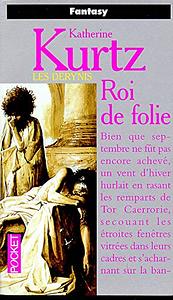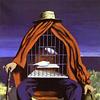Take a photo of a barcode or cover
'Camber of Culdi,' the first book in a trilogy, didn't quite work for me.
'Camber of Culdi' is set in a vaguely 14th-century, vaguely European kingdom. This world doesn't seem to have monsters, but it does have magic users of various stripes. It also has a church that is, basically, the Catholic church with magic. And I mean, really Catholic. This church uses the Latin mass and everything. In this world, when someone calls upon St. Michael for help with something, they expect the actual St. Michael to get in the game.
So, hey, that's fun. There's a tyrannical and hedonistic young king and a couple of virtuous factions who unite to bring him down. There's lots of plotting, a few swordfights and magical duels, and a whole lot of meditation on the duties of holy men toward an imperfect world. For some, this stuff is catnip. In fact, one of my most trusted recommenders of books gave this one five stars and put it in my hands. For me, well, I'm generally disinterested in the drama of feudal succession. I found the book to be somewhat plodding, as it's laying the foundation not only for the next two books in the trilogy, but for the trilogy which comes after. The villains struck me as very Villain 101, and the whole thing inspired me to spend a lot of time catching up on my social media feeds.
It's always a little awkward when a friend recommends a book that doesn't speak to me, but we recognize that not every book speaks to every reader. 'Camber of Culdi' didn't speak to me, but you might love it.
'Camber of Culdi' is set in a vaguely 14th-century, vaguely European kingdom. This world doesn't seem to have monsters, but it does have magic users of various stripes. It also has a church that is, basically, the Catholic church with magic. And I mean, really Catholic. This church uses the Latin mass and everything. In this world, when someone calls upon St. Michael for help with something, they expect the actual St. Michael to get in the game.
So, hey, that's fun. There's a tyrannical and hedonistic young king and a couple of virtuous factions who unite to bring him down. There's lots of plotting, a few swordfights and magical duels, and a whole lot of meditation on the duties of holy men toward an imperfect world. For some, this stuff is catnip. In fact, one of my most trusted recommenders of books gave this one five stars and put it in my hands. For me, well, I'm generally disinterested in the drama of feudal succession. I found the book to be somewhat plodding, as it's laying the foundation not only for the next two books in the trilogy, but for the trilogy which comes after. The villains struck me as very Villain 101, and the whole thing inspired me to spend a lot of time catching up on my social media feeds.
It's always a little awkward when a friend recommends a book that doesn't speak to me, but we recognize that not every book speaks to every reader. 'Camber of Culdi' didn't speak to me, but you might love it.
3 stars - Metaphorosis Reviews
King Imre is a Deryni, a magic-using descendant of the race that overthrew human kings some generations back. As he begins to abuse his powers, Earl Camber of Culdi and his family, also Deryni, plot a return to the human lineage.
I loved Katherine Kurtz' Deryni books when I first read them back in the seventies. Alaric Morgan and Duncan McLain rediscover ancient magics! There's a secret council! A young man finds he has secret powers! The books were great fun. In this second series, about Camber of Culdi, I liked going back to learn what the title character was really like. I recall being sorry there wasn't more about magic, but still - Camber of Culdi! Sadly, by the time the third trilogy came out, the magic was gone - almost literally. The books had devolved into purely fantasy-political stories. I kept reading, but eventually, when a book (I think King Kelson's Bride) came out in which nothing happened, I mostly gave up. Still, I remember liking the first two trilogies a lot, so I picked up this reissue of Camber of Culdi looking forward to re-reading an old favorite.
A long time back, while I was still enjoying the Deryni series, I read Ursula Le Guin's essay “From Elfland to Poughkeepsie,” in which she cruelly points out the essentially political, non-fantasy nature of the books. I saw her point, and I dislike fictional politics, but I liked these books anyway.
On this re-read, Le Guin's views came sharply back into focus. Counter to my memory, there's almost no magic in this book. Instead, it is a heavily political story about dynastic succession, with religious trappings and a hint of magic here and there for flavor. It's well written, but almost all of the writing is about things I don't care about. While I recalled Kurtz as being focused on religion, a lot of the book is what these days people would likely call ecclesiastical porn - lots of details of vestments and monasteries and priestly devotion; certainly far more than there is about magic.
[some mild spoilers below]
The books are also heavily male-centric. There are a few females involved - the evil temptress, the innocent maiden, the sympathetic friend. Granted, the books are a bit dated, but they're from the 70s, not the 30s. It's hard to set aside "if we do not support our men in their good works, what hope is there for any of us". And, of course, it's worse to kill women than men. Yes, it's a vaguely historical fantasy, but if we can have magic powers, why not independent women? Only in the bonus story - one of the best parts of the book - is there a woman who really acts for herself. The implicit condemnation of gays is less frequent, but no more palatable. That's not even touching the devoted servants who will do anything for their kind masters.
The bad guys are caricatures, and not very credible. Camber's son is very close to the cruel tyrant, but there's never any indication of why he would be - the guy is a cartoon villain, while the son is good and noble.
The book is of two minds. On the one hand, the plot machinations are to depose Deryni in favor of humans. On the other, it's clear that Deryni are special. While it's a given of the series that Deryni have special powers, Kurtz also seems to extend their special place to other issues - for example, "a thoroughness possible only for Deryni", which doesn't seem explained by their standard powers. This special place is nowhere more clear than in dealing with Cinhil - the reluctant pretender. Without really any qualms, his 'friend' and confidante waits until he trusts her, then messes with his volition - and we're meant to feel good about it.
All in all, a vastly disappointing return to the magic of yesteryear. I came into this book expecting to love it almost as much as I had before. Instead, I was mostly bored. I'd been looking forward to re-reading the first two Deryni trilogies. Now I'm a little worried about going back even to the first one.
If you want an alternate history stuffed with the ecclesiastical trappings, political machinations, and just the faintest bit of magic, this is for you. If you want a true fantasy, you may want to look elsewhere.
King Imre is a Deryni, a magic-using descendant of the race that overthrew human kings some generations back. As he begins to abuse his powers, Earl Camber of Culdi and his family, also Deryni, plot a return to the human lineage.
I loved Katherine Kurtz' Deryni books when I first read them back in the seventies. Alaric Morgan and Duncan McLain rediscover ancient magics! There's a secret council! A young man finds he has secret powers! The books were great fun. In this second series, about Camber of Culdi, I liked going back to learn what the title character was really like. I recall being sorry there wasn't more about magic, but still - Camber of Culdi! Sadly, by the time the third trilogy came out, the magic was gone - almost literally. The books had devolved into purely fantasy-political stories. I kept reading, but eventually, when a book (I think King Kelson's Bride) came out in which nothing happened, I mostly gave up. Still, I remember liking the first two trilogies a lot, so I picked up this reissue of Camber of Culdi looking forward to re-reading an old favorite.
A long time back, while I was still enjoying the Deryni series, I read Ursula Le Guin's essay “From Elfland to Poughkeepsie,” in which she cruelly points out the essentially political, non-fantasy nature of the books. I saw her point, and I dislike fictional politics, but I liked these books anyway.
On this re-read, Le Guin's views came sharply back into focus. Counter to my memory, there's almost no magic in this book. Instead, it is a heavily political story about dynastic succession, with religious trappings and a hint of magic here and there for flavor. It's well written, but almost all of the writing is about things I don't care about. While I recalled Kurtz as being focused on religion, a lot of the book is what these days people would likely call ecclesiastical porn - lots of details of vestments and monasteries and priestly devotion; certainly far more than there is about magic.
[some mild spoilers below]
The books are also heavily male-centric. There are a few females involved - the evil temptress, the innocent maiden, the sympathetic friend. Granted, the books are a bit dated, but they're from the 70s, not the 30s. It's hard to set aside "if we do not support our men in their good works, what hope is there for any of us". And, of course, it's worse to kill women than men. Yes, it's a vaguely historical fantasy, but if we can have magic powers, why not independent women? Only in the bonus story - one of the best parts of the book - is there a woman who really acts for herself. The implicit condemnation of gays is less frequent, but no more palatable. That's not even touching the devoted servants who will do anything for their kind masters.
The bad guys are caricatures, and not very credible. Camber's son is very close to the cruel tyrant, but there's never any indication of why he would be - the guy is a cartoon villain, while the son is good and noble.
The book is of two minds. On the one hand, the plot machinations are to depose Deryni in favor of humans. On the other, it's clear that Deryni are special. While it's a given of the series that Deryni have special powers, Kurtz also seems to extend their special place to other issues - for example, "a thoroughness possible only for Deryni", which doesn't seem explained by their standard powers. This special place is nowhere more clear than in dealing with Cinhil - the reluctant pretender. Without really any qualms, his 'friend' and confidante waits until he trusts her, then messes with his volition - and we're meant to feel good about it.
All in all, a vastly disappointing return to the magic of yesteryear. I came into this book expecting to love it almost as much as I had before. Instead, I was mostly bored. I'd been looking forward to re-reading the first two Deryni trilogies. Now I'm a little worried about going back even to the first one.
If you want an alternate history stuffed with the ecclesiastical trappings, political machinations, and just the faintest bit of magic, this is for you. If you want a true fantasy, you may want to look elsewhere.
I think I learned something about myself reading this book that doesn't really surprise me, but does give me pause a bit. I grew up with a new era of fantasy that has plot twists and excitement, and I kinda need that stuff. This felt old-school in a way I couldn't connect with. You basically knew the major elements of the plots after page 10. The characters were kinda generally good or evil without much meat, and the worldbuilding was pretty minimal. The writing was quite good, but man was I bored a lot of the time. This was a practice in patience for me, and a lesson: I have less patience than I thought.
adventurous
mysterious
reflective
slow-paced
Plot or Character Driven:
A mix
Strong character development:
Yes
Loveable characters:
Yes
Diverse cast of characters:
Yes
Flaws of characters a main focus:
No
A nostalgic read, but it holds up quite well to my memories. The medieval-based politics were more interesting to me this time around.
A s good as this was the first time I read it in late 70’s or early 80’s it isn’t the same now. I find it more lacking in this re-read. Fantasy was different in that time and the first time I read it the story was fresh and i missed a lot of the misogyny that I find in it now. I gave it 5 stars then and it could very well be a 3 now so I averaged.
adventurous
tense
medium-paced
Plot or Character Driven:
Plot
Strong character development:
No
Loveable characters:
No
Diverse cast of characters:
No
Flaws of characters a main focus:
No
This was a really good story and was richly told. But the dialogue was rather unpleasantly affected and made some of the more intimate scenes come across as unbelievable. The villains were also a little flat: there were moments where they seemed to have a bit more potential but those were fleeting and came to nothing. I think that this story could have been developed over two volumes and had the villains more fleshed out along with some of the aspects of Cinhil's development that happened off-stage, but I don't know that the writing style wouldn't leave something like that a bit too plodding. Overall, it definitely worked as it is and was an enjoyable read.
I didn't get much from the short story "Bethane" that was included at the end of this edition. It seems to be related to the first published trilogy in this series, which I haven't read, and I think it needed more context for me to care about it.
adventurous
reflective
tense
fast-paced
Plot or Character Driven:
Plot
Strong character development:
Complicated
Loveable characters:
Complicated
Diverse cast of characters:
Complicated
Flaws of characters a main focus:
No
adventurous
slow-paced
Plot or Character Driven:
Plot
Strong character development:
No
Loveable characters:
Complicated
Diverse cast of characters:
No
Flaws of characters a main focus:
Yes
Re-re-read of this book that I originally read back in high school, then read again 15 years ago. I think I definitely appreciate it more now. This series provides the historical backstory for the author's earlier Deryni trilogy, and shows the improvement in her craft. The characters have much more depth, and the plot proceeds at a much better pace. Overall, I'd probably call this something like an ecclesiastical fantasy? So many monks, priests, churches and monasteries! This book puts the fantasy ever further into the background and is really more of a historical fiction piece. There is SOME magic used in the story, but it's pretty rare. The main focus is more on the politics, drama, and action of overthrowing a tyrannical king. (I think that Mr. Martin must have read this book before writing Game of Thrones, because the evil king and his sister are definitely giving off some Lannister vibes :) )
I'm definitely looking forward reading the rest of the Deryni books. I never finished the series when they originally came out, so I'm curious to see where it all ended up.
I'm definitely looking forward reading the rest of the Deryni books. I never finished the series when they originally came out, so I'm curious to see where it all ended up.




